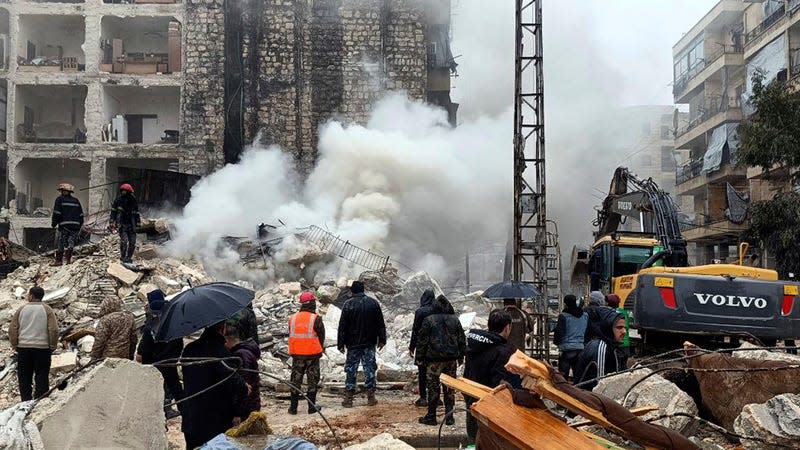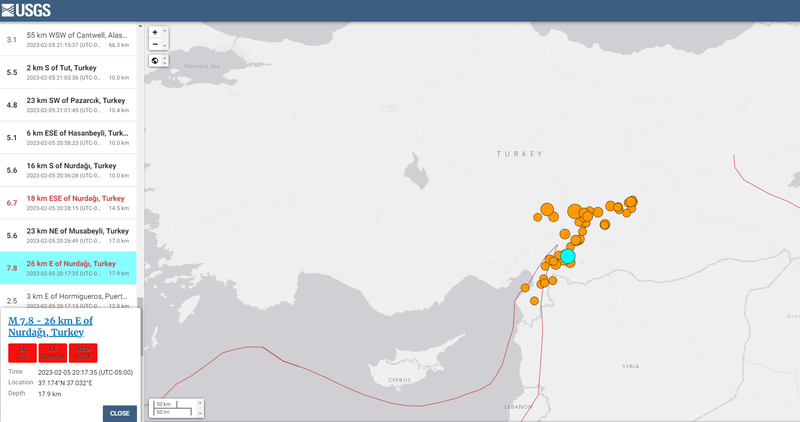Mapping Tech Deployed After Devastating Earthquakes Kills More Than 2,300 in Turkey and Syria

More than 2,300 people have been killed and thousands more injured in Turkey and Syria after a series of earthquakes hammered the region already beset by civil war and a refugee crisis on Monday, according to the Associated Press. Rescue workers and officials said that, as evening fell, hundreds more people remain trapped under the rubble of collapsed buildings, and that the death toll would likely continue to rise, per the AP.
The devastation began around 4:17 a.m local time on Monday morning, when a magnitude 7.8 quake—equal to the most powerful ever recorded in modern Turkey—struck centered near the city of Gaziantep in the south central part of the country, according to the U.S. Geological Survey. In addition to Turkey and Syria, the strong quake could be felt as far away as Cyprus, Egypt, and Lebanon.
Read more
These Winning Close-Up Photos Show Life That's Often Overlooked
Remembering Enterprise: The Test Shuttle That Never Flew to Space
Numerous aftershocks followed, and a separate 7.5 magnitude earthquake hit southeastern Turkey centered near the city of Ekinözü, about nine hours after the first magnitude 7.8 tremor.
The last time a 7.8 magnitude earth quake struck Turkey was 1939. That instance became the most severe natural loss of life event in 20th century Turkey, killing more than 32,000 people.

The USGS’s live earthquake map shows the first 7.8 quake in Turkey, along with the multiple aftershocks and additional tremors.
Amid Monday’s catastrophe, offers of aid poured in from dozens of nations and international bodies. Russian President Vladimir Putin said that Russia is ready to, “provide the necessary assistance,” to Turkey. A European Union policy official said that ten members states have sent search and rescue teams to help with immediate efforts to save survivors, according to the AP. The U.S. has also pledged support. “Our initial assistance operation to Turkey is already underway, and U.S. supported humanitarian organizations in Syria are responding to the earthquakes’ effects across the country,” said Secretary of State Antony Blinken in a press statement.
And among the global response, the E.U. has also activated its Copernicus satellite’s emergency management service. The system is intended to deliver fast and accurate, up-to-date maps that help in emergency response and further planning efforts. As of writing, completed maps haven’t yet appeared, but satellite imagery should soon offer a more detailed picture of the extent of damage.
#EMSR648 #Earthquake in #Türkiye🇹🇷
A destructive magnitude 7⃣.8⃣ earthquake has struck with the epicentre located near #Gaziantep, close to the border with #Syria🇸🇾
Our #RapidMappingTeam has been activated to monitor its impact
Updates ASAP
More at👇https://t.co/Rxfhj84v3R pic.twitter.com/KbmVI7l70i— Copernicus EMS (@CopernicusEMS) February 6, 2023
However, the Turkish government did not accept every offer of help it got. Elon Musk said on Twitter that SpaceX could provide satellite telecoms assistance through the Starlink network, with government approval. But an unnamed senior Turkish official declined Musk’s proposal, according to a report from Bloomberg. The official noted that Turkey has enough satellite capacity as is. Though certain areas are without electricity, the country reportedly has ground stations powered by batteries aiding with continued connectivity.
Musk has previously made similar offers of Starlink network connection to other countries in times of crisis, as in the Ukraine, following Russia’s invasion. In Iran, too, the billionaire said he had activated Starlink’s internet service in October, after the country cut off web access amid protests.
SpaceX is scheduled to launch the first communication satellite built in Turkey, Turksat 6A, into orbit sometime in the next few months.
More from Gizmodo
Sign up for Gizmodo's Newsletter. For the latest news, Facebook, Twitter and Instagram.

